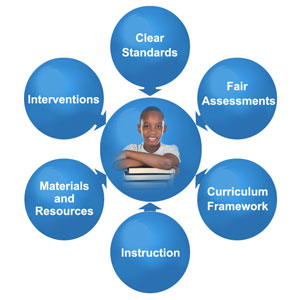 Today's Student of Tomorrow
Today's Student of Tomorrow
There have been many educational systems throughout the years which have emphasized one or two aspects of education over others. Most have only been moderately successful because they are linear systems that focus primarily on only one element of learning and subsequently only align to the needs of some students.
The power of the Standards Aligned System is that it is a nonlinear system that enables cross-alignment of the elements that all students need to be academically successful. It is important to note, that although we have examined how to use SAS to align each of these six elements in a linear order (starting with Clear Standards and ending with Interventions), in practice there is no step-by-step approach to aligning these elements. Student Achievement is what ultimately drives the decisions and determines the approach to alignment.
Student Achievement is the central focus of SAS. Aligning each of the six elements is essential to providing a basis for all students to be academically successful. Ultimately it is up to each student to achieve success, and without a student's full engagement and interest no system will guarantee academic achievement. This does not mean that administrators, teachers and parents are not accountable for student achievement. SAS provides the framework to align the elements that enable academic achievement, it takes teamwork and hard work to ensure that all students reach their full potential.
True academic achievement is a student's ability to learn on his or her own and apply what he or she has learned to their academic and career goals. Aligning what students need to learn today, with what they are likely to need to learn tomorrow is an essential component to academic achievement. Aligning the elements that support grade-level academic success addresses students' immediate needs and provides the foundation for future academic success. Building opportunities for students to use their critical thinking skills to analyze, evaluate and create will help them become lifelong learners who will be prepared for success in a knowledge-based economy.
